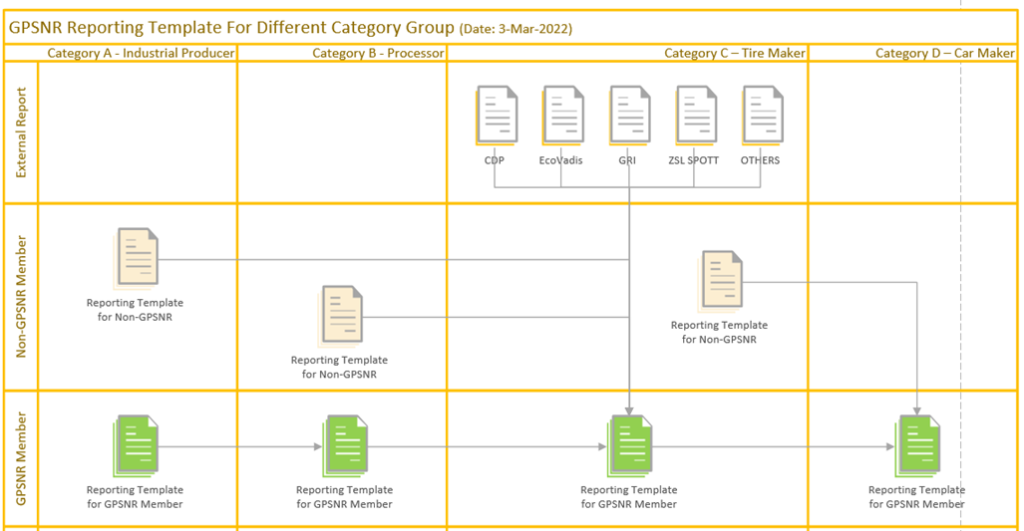Introduction & Background
The Global Platform for Sustainable Natural Rubber (GPSNR) is an international, multi-stakeholder, voluntary membership initiative seeking to lead improvements in the socioeconomic and environmental performance of the natural rubber value chain. Members of the Platform include tire manufacturers, rubber suppliers and processors, vehicle makers and civil society organizations. GPSNR’s structure consists of an Executive Committee and various Working Groups, supported by the Secretariat. All members meet and vote on resolutions at an annual General Assembly (GA).
Since its inception, GPSNR has been working towards smallholder inclusivity, particularly to ensure relevant representation of smallholders in GPSNR’s governance. As part of this effort, a series of workshops was conducted in the last quarter of 2019 aimed at raising awareness of GPSNR and the issue of sustainable natural rubber amongst rubber smallholders.
In 2020, 27 smallholders from 7 countries joined GPSNR as members. They will be participating, for the first time, in the GA scheduled to take place in September 2020. During the GA, a resolution will be proposed to form a new membership category for smallholders, which will be called ‘Smallholder Producers’. As an established category, smallholders will then be involved in voting on other resolutions and will elect representatives to be part of the Executive Committee.
GPSNR requires the services of a facilitator to facilitate several online sessions to prepare the smallholders for the GA, as well as their roles and responsibilities as members of GPSNR.
Objectives of the Sessions
The objectives of the online sessions are:
a) To foster relationships amongst smallholders from all 7 countries (particularly to encourage smallholders to interact with smallholders who are not from their country).
b) To familiarize the smallholders with fellow GPSNR members and GPSNR structure and governance, including but not limited to: Working Groups and their respective scopes of work and deliverables, knowledge of position of other member categories, GA voting process and the impacts of their votes.
c) To trigger and facilitate discussion amongst smallholders on subjects including but not limited to ensuring fair representation amongst smallholder representatives, identifying smallholder needs and priorities for GPSNR, and effective integration of smallholders into the fabric of GPSNR.
Roles and Responsibilities of Facilitator
The facilitator will be the main facilitator for the online sessions. Where necessary, subject matter experts (i.e. GPSNR Members) may be required to make specific presentations for certain sessions. For such sessions, the facilitator will take on a supporting and coordinating role. It is expected that the facilitator will be required to engage in several preparatory calls with GPSNR prior to the actual sessions.
Other responsibilities of the facilitator will include:
i. General familiarization with GPSNR structure and processes, including relevant organizational documents
ii. Familiarization with smallholders, inputs from the previously conducted workshops and national conversations
iii. Develop session methodologies and materials in conjunction with GPSNR
iv. Sessions must be participatory where possible, and designed to provoke critical thinking from the participants
v. Assist GPSNR in planning and coordinating the sessions, including communications to be sent to selected participants (e.g. any pre-workshop reading or activities)
vi. Provide a summary report of the sessions, with recommendations for follow-up activities and strategies to support smallholder integration based on the priorities and recommendations expressed by the participants
Qualifications and Experience
The facilitator should possess the following qualifications/ experience:
• Demonstrated high level of skill and experience in facilitating workshops or meetings involving farmer groups/ indigenous people from several regions
• Demonstrated high awareness and practical and inclusive facilitation skills in working in multicultural and multi-lingual workshop settings
• Experience in planning and designing participatory workshops and consultations with engaging facilitation methods and activities, preferably experience in facilitating online sessions
• Excellent communication skills
• Fluent in written and spoken English
• Fluency in one or more of the following languages is a plus: Bahasa Indonesia, French, Myanmar, Thai, Vietnamese
Submission Guidelines
Interested applicants should ensure that their application contains the following:
1. Profile of facilitator
2. References to similar work1 / projects undertaken
3. Proposed work-plan
4. Detailed costing set against tasks and deliverables
Please submit your application to stefano.savi@gpsnr.org by 24 July 2020.





